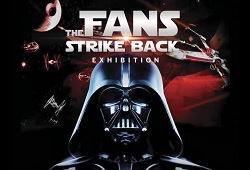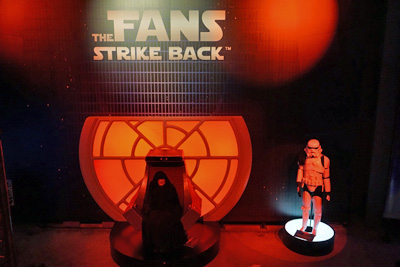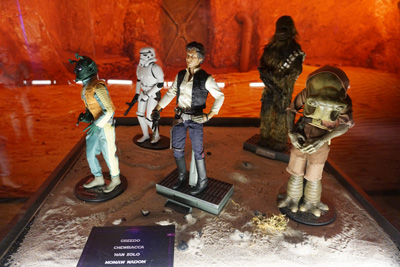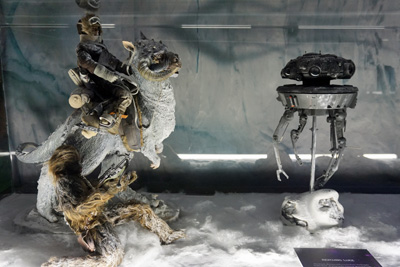
Rancho Obi-Wan is harder to find than the Rebel base on the ice planet Hoth. Located at an undisclosed location in Petaluma, California, the 9,000-square-foot non-profit museum was once home to 20,000 egg-laying chickens but now houses a personal collection of Star Wars memorabilia that megafan Stephen Sansweet has amassed since 1976.
Certified by Guinness World Records in 2014 as the largest assemblage of Star Wars merchandise in the world, Rancho Obi-Wan is open for limited viewing on select days of the week, and only for a small number of fans who are given the address after their reservations have been booked.
For those unable to make the trip to Rancho Obi-Wan, there’s The Fans Strike Back, a traveling exhibit of Star Wars memorabilia that has been featured in cities across Europe and the United States since 2017. The items featured belong to Daniel Prada, who was born in Madrid, Spain, two years after Steve Sansweet began collecting Star Wars memorabilia.
When Prada was eight years old, he had to stay awake for an entire night in preparation for a medical exam the next morning. To help pass the time, he watched the original Star Wars Trilogy, becoming immediately enthralled with the saga of George Lucas. A few days later, Daniel Prada received two Star Wars action figures as a birthday present and went on to amass the largest collection of Star Wars memorabilia in Europe.
“In the city where I live, in Spain, everyone knows my passion for Star Wars,” Prada explains of the origin of The Fans Strike Back. “The Department of Culture suggested that I exhibit my collection of pieces to introduce them to the inhabitants of the city. I liked the idea and the enthusiasm of the public was such that since then, I have been traveling this exhibit around the world.”
After successfully conquering Madrid, The Fans Strike Back did the same in Paris and then Budapest before making its way to Las Vegas and New York City. Taking up 10,000-square-feet of space and containing 600 pieces of Star Wars memorabilia, the exhibit covers the prequels, original trilogy, and sequels, although not as intensely with the more recent film offerings. Action figures, artisan statues, and an assortment of lightsabers and helmets are highlighted against striking graphic renditions of key Star Wars locales, from Tatooine to Hoth to the lava planet of Mustafar.
When the original Star Wars was released in 1977, very few manufacturers were interested in merchandising rights for a film, believing that by the time products were released, a movie’s theater run would have ended and the buying public no longer interested. George Lucas contacted all the major toy manufacturers nonetheless, including Mattel and Hasbro, but they all passed for the aforementioned reason.
A second-tier toy company in Cincinnati called Kenner – most famous for its Easy-Bake Oven – had just successfully launched a line of action figures based on The Six Million Dollar Man television show. They were thus willing to take a chance on Star Wars and signed a contract just one month prior to the film’s release. The resulting action figures weren’t just a success but an explosion that rocked the toy industry.
“In the late seventies and early eighties, you weren’t going to see the movies over and over,” Jason Luttrull, host of the Galaxy of Toys podcast, explained in the 2014 documentary Plastic Galaxy: The Story of Star Wars Toys. “For a lot of kids, the toys I think became more important than the movies, because they were going to get to play with the toys nearly every day. They were going to get to talk about the toys nearly every day.”
Kenner quickly realized that Star Wars fans weren’t simply interested in collecting major characters and began producing action figures for secondary and peripheral characters as well. The back of each package listed the characters available, with the words “Collect Them All” emblazed on the top. Fans took those words seriously – as if it was an actual command and not just a suggestion – and set out to buy every action figure available as a result.
“People didn’t collect toys back then,” Gus Lopez, author of Gus and Duncan’s Guide to Star Wars Prototypes, said in Plastic Galaxy. “But they were actually creating this whole culture of kids trying to collect all those toys.”
Kenner didn’t stop there, however, and soon Luke Skywalker’s landspeeder, X-wing starfighters, and the Millennium Falcon were appearing on toy store shelves across the country as well. “Clearly they saw this rich universe of Star Wars that George (Lucas) had created with all these environments and ships, and understood that this was a line,” Stephen Sansweet explained. “It was not just a few eight-inch, cloth-covered dolls.”
“The room wasn’t just a room,” collector Sam Perez remembered of his childhood in Plastic Galaxy. “It became the environment like I saw in the movies. So I’d pretend the top of my desk was the floor of the Death Star, or the table under my mom’s tan blankets thrown on the table now was the environment of Tatooine. That’s when I realized, ‘I need more characters here because I can’t do the rest of this movie on my own without more figures around. So I need Jawas, I need Sand People.”
Across the Atlantic Ocean in Madrid, Daniel Prada inevitably felt the same urge, leading to a lifelong collecting of Star Wars memorabilia. While The Fans Strike Back is his way of sharing his love of Star Wars with other fans, however, there is another element to the exhibit as well.
“In 2017, Spanish social networks elected us ‘Best Star Wars Exhibition,’” Daniel Prada writes on The Fans Strike Back website. “I am very proud of this distinction because it rewards the work of a lifetime. But above all, it rewards the teams that allowed me to give birth to this exhibition, all the artists, craftsmen and genius creators who designed and manufactured these incredible pieces.”
The Fans Strike Back is indeed a fitting homage to those creators, as well as the passion that Daniel Prada feels for the Star Wars Universe – a passion that is shared by millions of other fans around the world.
Anthony Letizia





